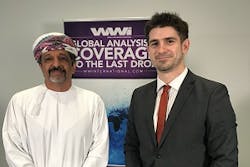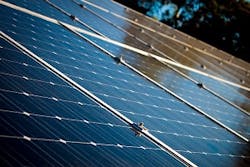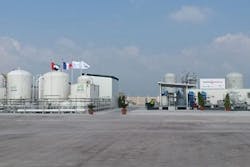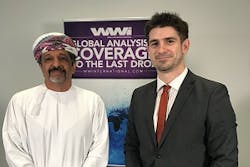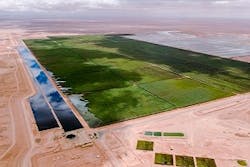Five things I learned at the International Water Summit, Abu Dhabi
Last week I attended the Abu Dhabi Sustainability Week, producing IWS-TV during the International Water Summit. All of our videos will be published in due course here, but here are my immediate five top takeaways from the event.
1) “Renewable desalination” is slow to scale
A few years ago there was a real buzz around the coupling of renewable energy with desalination. After all, it’s a solid match: desalination needs to shift its legacy image of energy guzzling facilities. By adding wind turbines or solar panels it’s a good way to do so. However, during my visit last week to the International Water Summit in Abu Dhabi it seems progress is dreadfully slow at scaling this up. At one point, there was talk of several projects becoming “the first” at large scale renewable desalinationproduction. However, it has mainly been pilot scale plants operating during the day and falling back on grid power during the evening for a 24/7 supply. To run a 24-hour large-scale solar powered desalination plant will be the much needed feather in the industry’s cap. Meanwhile, one beacon on the horizon was the announcement from the Abu Dhabi Water and Electricity Authority (ADWEA) of the Taweela reverse osmosis independent water project. Two 100 MIGD (455,000 m3/day) plants will be built for the development, with operations set to begin in October 2012. Naturally, given the scale of this project, there was no mention of coupling renewables. Looking ahead, the IDA’s Global Clean Water Desalination Alliance has set the goal for 20 percent of new plants to be powered by renewables between 2020-2025. The clock is ticking.
2) Masdar is evolving into water project development
Masdar has made a name for itself in the solar and wind power sectors, developing large scale wind power farms in the UK, Seychelles and Jordan. For water, it has taken a more cautious approach, starting with five small pilot projects in Ghantoot. Now it intends to learn from the experience and become a renewable desalination project developer and financer. To do so will require partnerships with EPC companies to fulfil the plant construction. Although the global desalination market is fiercely competitive, with multiple companies scrambling for limited new projects, this is positive news. Abu Dhabi, along with its Emirate brother Dubai tend to want to take leadership in areas where they commit financially. Masdar has the financial and political clout to provide a decent offering in desalination, just so long as it partners with the right company.
3) Meeting Oman’s reuse visionary
While producing IWS-TV during the event, I interviewed Sulaiman Al Qasmi, general manager for asset management at Haya Water. What a gent! Articular and passionate, Sulaiman is a true visionary for where was reuse can really go across Oman. Although Haya Water started off as a wastewater company for capital city Muscat, it is rebranding into Oman’s number one water reuse developer. Currently 40 percent of the wastewater collected is discarded back to the sea. The country fully intends to increase its 60 percent reuse rate and has money in the bank to develop the necessary projects. The challenge will be a political one: farmers are used to free water through groundwater abstraction. To charge them for treated effluent will be an uphill battle, requiring political and regulatory changes. If anyone can do it, Sulaiman is the man for the job.
4) Disruptive software is a gateway into water
The current industry buzzword of “smart water” continues to come up in conversations but can mean so many different things. The bottle water brand to one side (!), what I take from the phrase is smart water gives utilities new tools to intelligently bring together data to provide a more efficient service. I met an interesting start up from Canada called Emagin. The company’s business model is to lease software to utilities to provide data in user friendly interfaces. By partnering with IBM Bluemix, a virtual clone of the utility’s physical infrastructure is put onto the cloud meaning it can be monitored offsite. Real-time data is taken from SCADA systems, with results and insight then passed down to operators in the event of network anomalies. Testimony to the company's potential, Emagin also won the Innovate@IWS competion. For me, such companies are exciting to listen to, just as Israeli solution provider TaKaDu was when it came on the scene several years ago. The industry desperately needs new talent, fresh thinking and ideas to lead the smart water race so we should encourage the ‘new kids on the block’.
5) Reed beds are going mobile
I caught up with a good friend of mine, Dennis Alexandersen from BAUER Resources GmbH during the event. They are currently expanding the world’s largest constructed wetland in Oman to 175,000 m3/day, which treats produced water from Petroleum Development Oman. Although such developments need ample space to start with, the reed beds use gravity-flow and natural processes to reduce heavy hydro carbon loads. Any development that uses natural alternatives without the need for bricks and mortar is a winner in my book. In Abu Dhabi, the company announced it is taking this very idea mobile: containerised off-grid reed bed solutions, which can be dropped off to emergency situations, or even construction sites. Municipal wastewater is piped into the system, with resulting water reused onsite for irrigation or cleaning purposes. This is a logical move by the company and opens up a lot of potential new markets. It also taps into the need for decentralised solutions that can be quickly supplied, without the need for the planning and associated infrastructure of large treatment plants.
About the Author

Tom Freyberg
Tom Freyberg is an experienced environmental journalist, having worked across a variety of business-to-business titles. Since joining Pennwell in 2010, he has been influential in developing international partnerships for the water brand and has overseen digital developments, including 360 degree video case studies. He has interviewed high level figures, including NYSE CEO’s and Environmental Ministers. A known figure in the global water industry, Tom has chaired and spoken at conferences around the world, from Helsinki, to London and Singapore. An English graduate from Exeter University, Tom completed his PMA journalism training in London.
